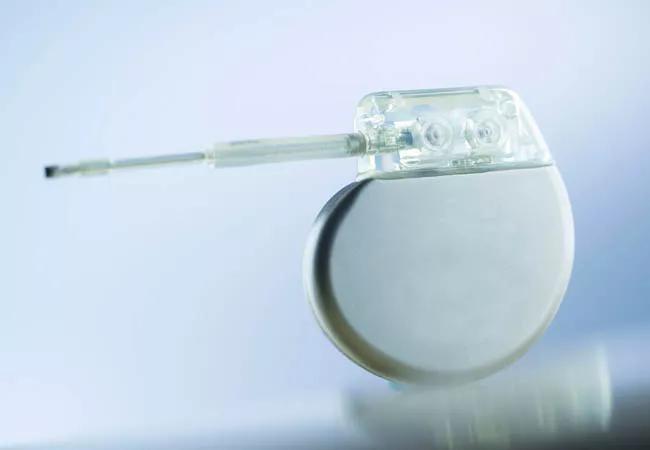Advertisement
Many overlook the signs of a slow heart rhythm

When your heart beats too slowly, it needs help. Pacemakers — tiny implantable computers that speed up a slow heart rhythm — are the answer for millions of people, from newborns to 90-year-olds.
Advertisement
Cleveland Clinic is a non-profit academic medical center. Advertising on our site helps support our mission. We do not endorse non-Cleveland Clinic products or services. Policy
However, “many people have no idea that they may need a pacemaker,” says cardiologist Bruce Wilkoff, MD. “Fainting — the clearest symptom of a slow heart rhythm, or bradycardia — is often their first clue.”
A slow heart rhythm deprives your organs of oxygen and nutrients. You can get lightheaded or dizzy when you stand up or exert yourself. You become short of breath and easily fatigued. You can pass out.
“Or you simply don’t feel good because your body isn’t getting enough blood to supply your need to breathe, move and think,” says Dr. Wilkoff.
Your upper heart’s right filling chamber (atrium) has a sinus node that controls, or paces, using electrical impulses that keep the heart beating in sinus rhythm.
It quickly adjusts your heart rate, which indirectly adjusts blood pressure as your metabolic needs change (for example, during rest or exercise).
When the sinus node doesn’t function, because of sick sinus syndrome or scars in your atrial heart muscle, your heart slows down — sometimes stopping for several seconds.
Heart block can also slow the heart. Here, the sinus node works fine. But the atrioventricular (AV) node doesn’t transmit its signals down from the atrium to the lower heart’s pumping chambers (ventricles).
“Heart block is like a cut wire in the heart’s electrical system,” explains Dr. Wilkoff. “The ventricles don’t get the signal they need, so they come up with a heartbeat on their own, which isn’t as good.”
Pacemakers are most often implanted in older patients who have acquired heart block or sinus node dysfunction.
“We implant pacemakers for patients in their 20s, 30s, 40s and 50s, but the average patient is 60-plus,” says Dr. Wilkoff.
When heart block is congenital, a pacemaker can be implanted right after birth, or in young adulthood when symptoms develop.
Pacemakers are usually inserted beneath the skin of your upper chest near the shoulder. Wires, called leads, run from the device into the heart using veins as the natural pathway.
Pacemakers are quite reliable. With each passing decade, they’re getting smaller and lasting longer.
“Today’s pacemakers are about the size of a big tablespoon, and the batteries last seven to 10 years,” says Dr. Wilkoff.
Advertisement
Little antennas in the devices allow doctors to collect information about each patient’s heart rhythm and pacemaker function. This allows them to customize pacemaker activity to fit the patient’s needs.
Pacemakers are monitored remotely while the patient is home, usually during sleep. “Most patients are amazed by their flexibility and sophistication,” says Dr. Wilkoff.
The newest pacemakers are leadless and work wirelessly. “They’re the size of a large jelly bean and sit in the ventricle. But they’re not suitable for every patient,” he notes.
With pacemakers, you can count on two things, he says: If you have bradycardia, they’ll help you feel and function a whole lot better. And the technology will continue to progress and evolve.
Advertisement
Learn more about our editorial process.
Advertisement

Factors like temperature, energy levels and sleep quality play a role in determining whether working out in the morning or evening is best for you

Obesity, age and preexisting heart conditions can all raise your risk of cardiovascular disease during pregnancy

Xylitol in processed food can increase risk of heart attack and stroke — but there’s no danger in xylitol in oral care products

If your provider has ruled out a serious cause, you can treat chest pain at home with antacids, inhalers or anti-inflammatory medications

Walking is a great goal, but how many steps are best for you depends on factors like your fitness level and age

Research shows a strong association between rheumatoid arthritis and heart issues

Eating more natural, whole foods can lower your risk of heart and cardiovascular diseases

First things first — slowly sit or lie down

Focus on your body’s metabolic set point by eating healthy foods, making exercise a part of your routine and reducing stress

PFAS chemicals may make life easier — but they aren’t always so easy on the human body

While there’s little risk in trying this hair care treatment, there isn’t much science to back up the claims